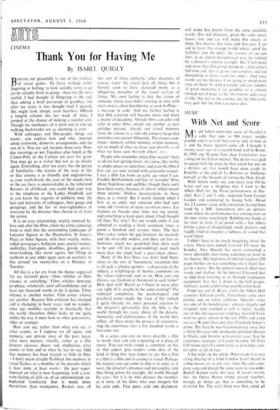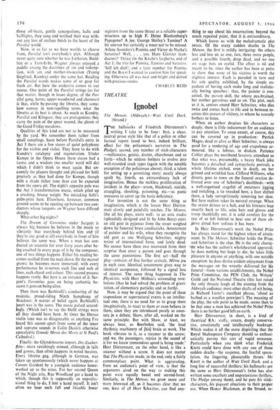With Net and Score
MUSIC MY old Schott miniature score of Parsifal is a cube that runs to 900 pages, weighs pounds and is so frail that you've only to look at it and the backs (paper) come off. I bought it twenty years ago at a second-hand stall in Rome. In 1946 any Wagner later than Tannhaiiser was a drug on the Italian market. The dealer was glad to accept half the price he first asked but put on a distress act that would have done credit to Rodolfo at the end of La Boheme or Amfortas himself at the thought of torture-by-Holy Grail.
With Schott under my arm (next time I'll be brave and use a shopping net), I went to the Albert Hall for the Prom performance of Par- sifal, Acts 2 and 3 only, imported from Covent Garden and conducted by Georg Solti. About Act 2 I cannot speak with conviction, having been lured by a BBC functionary into an upstairs room where the performance was coming over on the-new stereo wavelength. Rubbing my hands at the treat in store. I sat down with a few others before a pair of disquietingly small speakers and loRliy tried to imagine a richness of sound that wasn't there.
I didn't have to do much imagining about the voices. These were unduly forward. I'll swear the Kundry, Amy Shuard. has never committed a' more splendidly harrowing wakening-up howl in the theatre. Her high note of eldritch laughter 250 pages further on was something else I shan't for- get in a hurry. But the general musical effect was rowdy and shallow. At the interval 1 learned that we had been listening to or through inadequate equipment. For Act 3, down to the hall proper, thatvast. warm, comforting reverberation-bath.
From my seat (1_ Block, stalls) the Albert Hall acoustics behaved civilly. Everything came over precise and on velvet cushions. Shuard's voice was one of the beneficiaries : phrases shapely and eloquent: tone rounded as well as 'white'; hardly any of the old occasional stridency. Gottlob Frick went to opera school in the late 1920s and came out as a Wagner bass just after Friedrich Schorr's prime. Yet here he was Gurnemanzing away like a thirty-five-year-old, producing polished phrases in blacks and browns with greater ease than he sometimes manages at Covent Garden. Of Fritz Uhl (name part) I cannot write as glowingly; can- not glow at all, in fact.
A big night on the whole. What made it so was string playing of a kind London hasn't heard in a blue moon: or, at any rate, since the same com- pany sang and played the same score in situ under Rudolf Kempe early this year. It wasn't merely that the Opera House strings played together, though, as things go, that is something to be thankful for. The vital thing was that, amid all
/those off-beats, gentle syncopations, halts and halflights, they sang and writhed their way with- out any loss of surface finish to the heart of the Parsifal world.
Now, in so far as we have worlds to choose from, Parsifal isn't everybody's pick. Although never quite sure whether he was Lutheran, Budd- hist or a Turn-It-In, Wagner always enjoyed_ a paddle among the doctrines of sin and redemp- tion, with sex and mother-invocation (Young Siegfried, Kundry) under the same hat. Reading the Parsifal words makes some of us gasp for fresh air. But here the orchestra comes to our rescue. One point of the Parsifal strings (as for that matter, though in lesser degree, of the Par- sifal gong, horns, upper-woodwind and choruses) is that, while by-passing the libretto, they some- how convey in non-repelling terms what the libretto at its best is about. As much as Kundry, Parsifal and Klingsor, they are protagonists; they carry the pain of the spear wound, the gleam of the Good Friday meadows.
Qualities of this kind are not to be measured by the yard. We remember them rather from Small samplings. Soon before Parsifal's entry in Act 3 there are a few staves of quiet polyphony for the violins and violas. They have to do with Kundry's catalepsy and regeneration. Under Kempe in the Opera House these staves had a caress and a wisdom (no smaller word will do) which I didn't think to meet again. But un- cannily the players thought and phrased for Solti precisely as they had done for Kempe, though with a shade richer tone than can be expected from the opera pit. The night's opposite pole was the Act 3 transformation music, which piled up a crushing, brassy weight. No mistaking Solti's palm-print here. Elsewhere, however, common ground seems to be opening up between two con- ductors whose tangents on Wagner have differed sharply.
What other big nights?
The Dream of Gerontius under Sargent is always big because he believes in the music so vibrantly that everybody behind him and - (if they're any good at all) everybody in front of him believes the same way. When a man has con- ducted an oratorio for over forty years after be- ing coached in every page of it by the composer, one of two things happens. Either his reading be- comes ossified from the neck down. Or the marvel grows; he becomes more immersed; with every performance he re-nerves each line and web of lines, each chord and colour. This second process happens rarely. But here is an instance of it. Sar- gent's Gerontius goes on being authentic be- cause it goes on being alive.
Then there was Barbirolli's conducting of the majestic, proud-riding Ninth Symphony of Bruckner. A matter of belief again. Barbirolli's heart was in the score. The music pulsed accord- ingly. (Which isn't to say the Halle strings were all they should have been. At times the fibrous violin tone was as disagreeable as anything I've heard this season apart from some of the tenor and soprano sounds in Colin Davis's otherwise apocalyptic Grande Messe des Marts at St Paul's Cathedral.) Finally: the Glyndebourne import, Die Zauber- Pie : more ravishingly mimed, although in tails and gowns, than often happens in noted theatres. Every libretto gag, although in German, was taken up spontaneously (which never happens at Covent Garden) by a youngish audience liome- worked up to the nines. For her second Queen of the Night aria, Rae Woodland got a hand to which, though this is supposedly an unprofes- sional thing to do, I lent a hand myself. It isn't often we hear such full and likeable lower
registers from the same throat as a reliable super- structure up to high F. Heinz Blankenburg's Papageno? A joy. George Shirley's Tamino? A bit uneven but certainly a tenor not to be missed. Arlene Saunders's Pamina and Victor de Narke's Sarastro? Well, . . . yes. Hans Gierster (con- ductor)? Thrice (in the Knabe's larghetto, end of Act 1; the trio for Pamina, Tamino and Sarastro. `Soil ich dich'; and a later number for Pamina and the Boys) I wanted to caution him for speed- ing. Otherwise all was neat and bright and dotted with precious stones.
CHARLES REID






























 Previous page
Previous page